Don't wanna be here? Send us removal request.
Text
You know, I'll give Arcane S2 this.
There is actually one attack we are shown in full, from start to finish, during which attackers are shown to explicitly bypass civilians, and to target and engage with only clearly-designated enemy soldiers, enemy heads of state, and one (1) additional individual actively engaging in combat against them.
So let's all give it up for our ethical queen:

948 notes
·
View notes
Text
caitlyn fights ambessa to defend piltover, not zaun. caitlyn loses an eye defending piltover, not zaun. the fact that zaunites incidentally escape being turned into viktor's funtime robots as a result of ekko and jayce's efforts seems no more than that in relation to cait's actions: incidental.
at no point does caitlyn actually express any genuine introspection or understanding of the harm her actions have inflicted on the undercity as a whole. she is never confronted with it; she never has to face it, or bear witness to it; she never has to internalise it or take any accountability for it, beyond expressing vague private platitudes to ambessa about how maybe... violence... is actually bad after all? of course, we never actually see what causes her to have this offscreen change of heart, which makes it comes across less like she cares for the actual people being harmed under her watch and has come to some genuine realisation about how she has taken a wrong turn, and more as though the uncouthness of it all simply offends her personal sensibilities. like she cares less about the people being harmed, and more about being able to maintain her own internal self-image as a Nice Girl With Good Morals.
vi isn't angry with cait, isn't, "holding cait accountable," because of what cait did to the undercity. vi is angry with cait because cait's collaboration with ambessa got vander and isha killed, and jinx arrested. cait is regretful to vi because her collaboration with ambessa got vi's father and isha killed. vi has no thoughts on cait's oppression of zaun, seemingly no lingering guilt over her own participation in it. as far as the show is interested in conveying, vi never once even encounters the effects of cait's crackdown on the broader undercity, so why should we believe that she's invested enough to hOLd cAiT aCcOUntaBLe for it?
their argument, and cait's subsequent remorse, is 100% about events that have impacted them and their immediate relationships personally. cait's self-reflection is entirely about how she feels bad about the events at the commune and how she is simply tired of being a little hater. cait's decision to let jinx go is entirely about her and how she is 'tired of hating jinx and hating herself', and about doing a personal favour for vi (and in doing so, mind, robs everyone else who has lost a loved one to jinx's bombings of justice, because of course it was never about justice for anyone else; it was just about what caitlyn wanted).
the show cannot have cait go literally the entire runtime of the series without ever once being confronted with the ramifications of her actions upon the general populace of the undercity, and then expect me to buy that she even understands the extent of the harm she's done, never mind feels genuine remorse about it.
you know what would have helped sell cait's remorse? have her, say, escort singed into the commune when he goes to talk to viktor, and have her spend a long shot just standing there in silence as she waits. let her stand there and watch, seeing all the actual, real, flesh-and-blood people of the undercity arrive at the commune, coughing and wheezing from the after effects of the grey (you know, like that shot they cut from the firelights hideout); bearing bullet wounds and other injuries from enforcer crackdowns; abrasions around their wrists from handcuffs. let her see those people recognise her, Dear Leader Kiramman, the woman whose smiling face is on all the posters overlooking their suffering, overseeing it, whose actions have brought it about; let them react to her with fear. let her just stand there, in silence, and witness some of what she has wrought, and let the audience see that realisation land for her. that would have taken, what? 15, 20 extra seconds of dialogue-free footage? and would have gone a long way to salvaging cait's character arc this season.
but instead, the writers care more about doing narrative backflips and pretzels to shift blame onto ambessa and avoiding having to depict caitlyn as in any way meaningfully responsible for the events that occur under her military dictatorship, because that might come a little too close to holding their fave accountable.
hope that helps!
Quick tell me why you hate caitlyn kiramman without using "because she's a cop"
226 notes
·
View notes
Text
i had a nightmare that andor s2 dropped and it was bad
tony gilroy don't you dare pull an arcane s2 you're my only hope
#andor s2 drops and turns out luthen died at the end of s1 and except for a montage & a sad monologue from cassian everyone forgot he existed#and now that he's dead all of cassian's trauma is p. much forgotten and he doesn't wanna fight the empire no more#instead he adopts a plucky orphan child and relives the childhood he never had by teaching it to pod-race#also it turns out cinta was an evil spy all along#for some new third party big bad#vel has an entire arc about it but it happens offscreen#the third party is the Real Big Bad of the series and was just manipulating the poor empire all along uwu#the empire and the rebellion have to team up to defeat the third party with the power of friendship#dedra also has an entire arc that happens offscreen where she realizes that fascism is bad#she meets vel and immediately defects#nobody in fandom is allowed to point out the fact that she did a fascism because she's a lesbian and that's homophobic#dedra & vel have steamy lesbian sex - sorry i mean sesbian lex - in the commandeered hotel room where dedra tortured bix#nobody in fandom is allowed to point out that this is kind of weird because they're lesbians and that's homophobic#also syril gets transported to an alternate universe where kino loy is alive and never went to prison and adopted him as a child#he learns the meaning of friendship and then gets transported back into the main plot in time to save the day#he also realizes that he was in love with sgt. mosk all along#because he made out with alternate universe sgt. mosk who is unproblematic and conventionally attractive#also the surprise Fourth Party Big Bad is... [checks notes] thinly veiled red scare allegory robot eugenics jesus#okay i guess that one's kind of on brand for the star wars universe#but in andor s2 robot eugenics jesus is nemik who was resurrected from the dead by force magic#he is saved from his evil path by skeen (who was convinced by a time-travelling nemik from another dimension)#who tells robot jesus nemik that he just needed to stop loving revolution so much by getting over his personal insecurities#they touch foreheads and vanish#it is a yaoi revolution#also in the final battle cassian has to take down a super mega killer droid#we find out tragically that robot jesus nemik tragically found a funerary recording and tragically reverse engineered an AI and tragically#the super mega killer droid is actually... MAARVA!!!!!#back from the dead!!!#she is tragically revived and tragically killed a couple of times for the tragedy of it all#then bix - who has been suicidal the whole season - sacrifices herself to take maarva out while sad slow-mo music plays (or DOES SHE?????)
18 notes
·
View notes
Note
hello! stumbled across a post about whether or not the Grey is a chemical weapon by @bwat5-blog and was curious what you think about it
Has me blocked, lol.
But I feel confident in saying that as long as these people - and Amanda Overton - justify their opinions on the Grey by basing it on the fundamental fantasies that:
not only is gas a precision weapon, but it is so magically precise that it can actually swerve around the children and random low-level nobodies like Thieram working their 9-5 in Shimmer factories and Chembaron headquarters (and there are a lot more Thierams than there are Sevikas),
the gas is also so precise and their use of it against only the evilest of the evil cartoon baddies was so strategic, that they... [checks notes] used it in the streets to clear people off them to 'keep them safe',
gassing the poors and a boots-on-the-ground invasion were definitely the only two options, and we should definitely take that uncritically and at face value when told to the audience by the people who have a specific and vested interest in mounting a boots-on-the-ground invasion and/or gassing the poors; that war in the Middle East undercity is the only way to keep us good guys safe! from the terrorists! the terrorists, you guys! and drone gas strikes actually save innocent lives!; and that all this is definitely not a false dichotomy that requires both the viewer and everyone else involved to conveniently forget that every Councillor still alive already voted for Zaunite independence, and that the quickest way to deescalate the situation in which it appears to everyone (except Jayce, who never says shit, lol) that the memorial attack was a strike against an oppressor after independence negotiations failed, is to simply grant Zaun its independence effective immediately, tell them Jinx is their problem now, and that any further attacks on Piltover's sovereign territory, from Jinx or anyone else, will be considered an act of war and responded to accordingly,
the gas is never ever ever shown to do long-term harm to anybody, especially anybody innocent, uwu, when:
- there is a confirmed cut shot of innocent refugees arriving in the Firelight hideout coughing and wheezing from the Grey, which, idk about you, but I consider a shot that made it into the script and was mostly animated before being cut to be more canon than Amanda 'Cait-is-my-self-insert' Overton's random instagram headcanons,
- the newspaper from the (supposedly canon!) Jinx Fixes Everything game is clearly talking to the everyman who is being harmed by the Grey, and,
- literally onscreen, we see that the goons in Margot's HQ were simply knocked out and left to lay there in the Grey, barely breathing. They weren't important enough to bother arresting, but they were soooo evil and dangerous that they warranted incapacitating with the Grey and then simply being left to lay there, struggling to breathe in the lingering gas, until some random good samaritan (who?) came by to drag them out. But I'm sure they're fine, right? And even though they didn't do anything that merited being arrested in the eyes of the Gas Squad, they definitely deserved whatever they got, right?
then they are wrong on a fundamental level and idgaf what they have to say, lol.
78 notes
·
View notes
Text
scrolling someone's perfectly enjoyable fandom blog and then running face-first into a bunch of terf posts 0/10 jumpscare would not recommend
24 notes
·
View notes
Text
not to be, like, politiquelle in my discussion of the response to famously non-political show Netflix Arcane™
but it's so genuinely unsettling to see people who would probably characterise themselves as Nice Liberals with the Right Liberal Opinions turn around in the year of our lord 2024-2025 and without a single moment's hesitation, employ rhetoric like
criminals are not civilians, and if you commit a crime, the police can take away whatever rights they want
drone gas strikes save lives, the ONLY alternative to drone gas strikes is boots-on-the-ground military action, there's NO OTHER WAY
(and we know there's no other way because the people who wanted to do the strikes said so, please don't question this false dichotomy)
gas is a precision weapon. we can program gas to only hit terrorists and criminals, actually
and if any children or factory workers or non-violent offenders or bartenders are harmed, well, then they should have thought of that before being terrorists and criminals
(remember, this is the ONLY WAY. don't think about the fact that attacks are seemingly happening out of a desire for independence and that every councillor still alive already voted for independence, this is THE ONLY WAY)
how do we know everyone in that building we hit was a terrorist and a criminal? well, intelligence reports allowed us to designate that building a terrorist and criminal hideout. so, ipso facto, everyone in it must have been a terrorist and a criminal. QED.
no civilians were harmed in the making of this precision attack :)
those who say civilians were harmed as a result of this precision attack are making up the numbers :)
this is the ONLY WAY :)
please do not talk about alternative solutions. there is no other way. look at the rainbow flag sticker on this gun!
truly, this is the most moral army in the world
#liberals (derogatory)#i mean we knew#but if all it took for you to go mask off was a cartoon...#“i support this powerful well-funded technologically superior force doing 'targeted strikes' against terrorist animals... in my cartoon. :)#arcane critical
401 notes
·
View notes
Text
that particular flavour of caitvi stans screeching at critics of S2 about how, "you just wanted a simplistic happy ending! you can't handle the NUANCE! you have no MEDIA LITERACY!" while simultaneously insisting that we should all unquestioningly accept and praise arcane for giving us caitvi, which they hold up as the sine qua non of wlw representation, because their primary basis for comparison is... legend of korra. is she-ra. is owl house. is steven universe.
none of this is shade on those shows. all of these are okay-to-good-to-great shows, that did genuinely brave things with regard to representation and which often handled mature subject matters in age-appropriate ways. you know what they also are?
children's cartoons. they are cartoons for children.
sorry, when shows like black sails and andor exist, which have prominent wlw characters/ships, and which embed those ships in actually well-written, complex, adult narratives about freedom, oppression, rebellion, and self-determination, arcane doing a, "diversity win! your cops are lesbians!" is not enough for me to give it brownie points.
#caitvi stans consume media that is intended for adults challenge (impossible)#if arcane wants to pretend to be a Big Boy Show then it can handle being critiqued and compared to other Big Boy Shows#arcane critical#note: if u are a normal caitvi shipper who does not immediately throw a tantrum upon beholding criticism of s2 then this does not apply to#ok thanks
342 notes
·
View notes
Text
Anthropological and philosophical analysis of Viktor’s story in Season 2 - Part I
Finally gathered thoughts that floated in my mind since Season 2 had ended. These will literally be my first posts ever, will be a bit chaotic, please be kind, I’m shy. But also very critical.
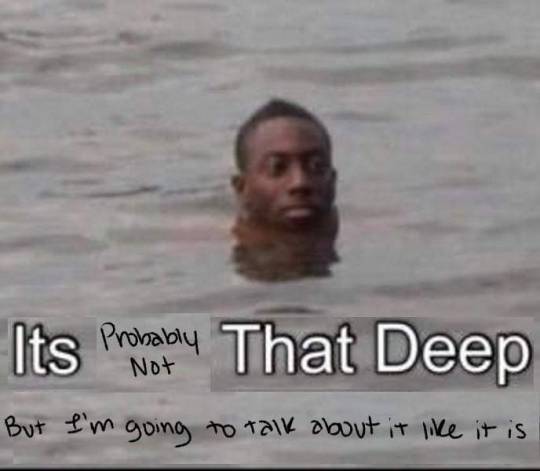
I’ll preface this by saying that I’m not a person with a disability. I cannot claim to know this experience, because I simply don’t. I love Viktor as a character and it so happens he has a disability, it’s something I always consider when engaging with his story. Besides, his story revolves around his disability since S1 Act 2 and he kind of falls into the trope of ‘disability as character motivation’, but he’s much more than that. And that’s what I want to explore in these posts.
My analytical approach is obviously influenced by my experience as an able-bodied person. I’ve had extensive courses on disability studies while at university and focused my bachelor’s thesis partially on disability representation in media (I focused on scars and ‘deformities’, something many Arcane characters have, but that’s perhaps for another post). To people out there who have disabilities and wish to engage with this post - please let me know your thoughts, I’m genuinely trying to learn more.
I want to stress that in my analysis I’m not saying Viktor is entirely ruined as a character by the writers or is bad disability representation. I analyse his story from the perspective of philosophical, cultural and social contexts, and through disability studies theory. I’m not an expert and certainly can't speak on behalf of people with disabilities, I'm talking as an anthropologist and enjoyer of storytelling and art.
Ok that being said, I’ll try to make it coherent and divided by topics, because these’ll be long posts. Some thoughts are a bit disjointed, I’ll be sharing some of my ideas for how Viktor’s arc could’ve been improved. Hopefully it makes sense as a whole.
TRANSHUMANISM & POSTHUMANISIM

Transhumanism as a philosophy and social movement originates from the notion that many people are forced to live worse lives than necessary and can’t reach their full potential. One of the most important thinkers of transhumanism Julian Huxley argued that application of science can prevent poverty, illness and change the world for better. He literally wrote that ‘the man can manage evolution’.
Viktor represents transhumanist ideology in a way that, in Season 2, he literally can’t refuse the job - he was forced the moment Jayce fused him with the Hexcore. Sure, he could have refused to use its power, now residing in his body. But the writers chose to disallow him that choice. So Viktor ‘heals’ Huck and begins his Jesus Era. Viktor later asks Singed if the doctor believes in fate, which is followed by Viktor declaring evolution has a course - superseding nature. This way Viktor exemplifies Huxley’s idea of what transhumanism is:
(...) whether he [man, as in human] is conscious of what he is doing or not, he is in point of fact determining the future direction of evolution (...). That is his inescapable destiny and the sooner he realizes it and starts believing in it, the better for all concerned. (Huxley, Transhumanism)
If the Hexcore was actually sentient and controlled Viktor, then I guess it’s the soul of Julian Huxley.
The same way Huxley's work was grounded in a desire to make the world a better place, so is Viktor’s. His dream of betterment of his people was the primary motivation of Viktor’s character, but it got hijacked by the magical mumbo jumbo of the Hexcore and Arcane powers in S2. His transhumanist ideology wasn’t developed organically, the story just jumps to act 2 and then 3 without proper explanation as to why he turned to this philosophy so radically.
Important to add, Huxley was a eugenicist. Kinda wild to take transhumanist ideas and write Viktor’s, a disabled dying man’s arc, the way they did. Viktor wanted to use technology to change the world, but writers said: ‘hmmmm, what if… magic?? And eugenics! because he has internalised ableism now!’ But more on that later.
Central question regarding transhumanism is who decides what’s an enhancement and what’s a limitation. The short answer is: it’s a personal choice, we can use inventions to improve quality of life if we wish. Yes, some things can be a choice, but in reality it’s kind of compulsory, because the society is built in a way that demands conformity.
Viktor changed himself instead of trying to change the world the way he intended to in S1. His arc was derailed from his initial will to act for the society that needed positive change. Progress for Piltover meant technological advancement in the name of scientific and economic gain. In Viktor’s transhumanist vision, progress is about extending the self - to live without suffering, to cure physical and mental afflictions of Zaunites. It goes beyond his motivation to cure his disease, his actions in S2 don’t fit his characterization in S1. This is why I believe inserting parts of his original League Lore into Arcane would have made an amazing story with transhumanism as background.
Good part of technology is that it gives us opportunities for different forms of embodiment. Embodiment, important in phenomenology and feminist studies, means how we experience ourselves as a living body that feels the world as we inhabit it - how we experience it in connection to us, simultaneously being influenced and influencing the world. There’re plenty of theories that tackle this concept, but let me go the short way.
Transhumanist philosophers talk at length about progress in relation to embodiment. Some critics ask questions about the ethical side: who’s gonna get to use the technology to enhance themselves? What about people who can’t afford technology used for the enhancement? How will technology influence the embodiment of certain people? Specifically, what does this philosophy say about disability?
I will talk more about disability in another section, but the transhumanists consider physical disabilities as something open to changes. Different technologies can be used as mobility aids, different advanced procedures could help in various ways improve the standard of life for people with disabilities.
But there still remains a question: what kinds of disability are considered in need of improving by technology? If technology changes a disabled person's body so they can function similar to able-bodied people, then is the category of 'disabled' even relevant anymore? Is there a definite line when it comes to influencing the body with technology? What kind of progress do transhumanists actually seek and for whom?

We don't hear Viktor’s stance on ideas similar to transhumanist ones, until his talk with Singed, but it's a bit convoluted and isn't developed well enough to be an interesting take on a very controversial and fascinating philosophy that is transhumanism. It’s only indirectly addressed at the end by Old Man Jenkins Viktor when he says ‘There’s no prize to perfection, only an end to pursuit’, meaning that the glorious evolution doesn't really have a destination, even though Viktor believed so.
The change transhumanists seek can never actually reach a final, perfect end - who and when will decide what the end of human evolution looks like? What is the ultimate, trans- or even posthuman form we’re supposed to achieve? Arcane seems to argue that nobody will ever be able to decide, even with godlike powers and knowledge.
Old Man Jenkins Viktor calls back to primary belief of posthumanism, which Nietzshe wrote about:
Man is not the effect of some special purpose, of a will, an end; nor is he an object of an attempt to attain an ‘ideal of humanity’ or ‘an ideal of happiness’ or an ‘ideal of morality’. It is absurd to wish to devolve one’s essence on some end or other. We have invented the concept of ‘end’: in reality there is no end. (Nietzshe, Twilight of the Idols)
Posthumanism is another philosophy that provides an interesting context for analysing Viktor’s arc in S2. I first focused on transhumanism, since his story originally involved using technology to change lives. But Viktor seems to mix transhumanism and posthumanism.
Posthumanism is more about getting rid of core values of humanism. it’s about going beyond what makes humans, well, humans, which is a lot of things (biology, culture, economy, science, politics, environment, religion, social relations ect.). Posthumanism states that humans aren’t really that special, and argues that there are many other creatures and things that are equally as innovative as humans. It’s a philosophy critiquing anthropocentrism. It dismisses the notion of humans as apex creatures that can control and bend the world to their needs and will. The will to extend ourselves and find power within us isn’t exclusively a human trait - all organisms and things on Earth have that potential. (Interesting, that in the destroyed Piltover Jayce saw, the flora and fauna still expanded at the top of the Hexgates).
Viktor’s story isn’t really about that, but it ties to posthumanism when Viktor declares that emotions clash with reason, humanity is a contradiction which causes destruction, so there’s the need to go beyond humanism. Viktor’s ideas about human nature aren't really posthuman. His thought as he was dying after Jayce's attack revolved around the humanist idea that humans actually have an unchangeable essence.
Posthumanism, as understood by Gilles Deleuze and Félix Guatarri, states that there’s no essence of ‘humans’. There’s only the potentiality, which comes from an individual will to create oneself, apart from fixed rules of the world. Funny enough, Viktor speaks about similar ‘charge, potential, impulse', but I don’t think it’s in any way connected to Deleuze’s idea. The philosophy of Viktor in S2 seems all over the place with trans- and posthuman ideas underneath, but it's an interesting mix that I wanted to explore, even if only on surface level.

Deleuze is fucking difficult to understand, French philosophers are the demons that always kick my ass, but they had some good stuff to say. In Postscript on the Societies of Control Deleuze claims that society is made by machines, not only in technological sense, but also by different systems: social, political, economic, religious ect. Every system is a machine. In the case of Piltover and Zaun, the social and political machines categorize people and program them to inhabit certain identities and spaces. Human body is also a machine consisting of different anatomical systems. We are machines living in machines, the flow of information and experiences between us and the world is constant. In a way, even before Viktor tried to change everyone into machines, the world was already run by machines.

I also think that technological posthumanism is an amazing lens to analyse the usage of Hextech and its final destruction of the world in Arcane. Technological posthumanism states that humans use tools and technology as integral to our identity and functioning. Inventions are made by humans, but inventions also invent humans - we use tools, art, machines, that extend us, that make us. Humans don’t make technology because they’re free and rational, rather they’re free and rational because they make technology.
Donna Haraway says we're already cyborgs, because tool-making and technology is always a part of our evolution - we incorporate the world into our bodies. We use tools, but according to posthumanism, tools use us in some sense, like a parasite. Interesting that Viktor becomes literally a mix of flesh and machine, influenced by the Hexcore.

Going further, posthumanist thinker Bernard Stiegler writes:
(...) the pursuit of the evolution of the living by other means than life - which is what the history of technics consists in, from the first flaked pebbles to today, a history that is also the history of humanity. (Stiegler, Technics and Time, 1)
Evolution's course is always directed by technology and tools. Stiegler asks: ‘Who’ or ‘what’ does the inventing? ‘Who’ or ‘what’ is invented?.
Jayce and Viktor invent Hextech. Piltover, City of Progress, is made by the development of Hextech. Hextech invents Piltover’s identity, makes its citizens and government free, rational, innovative and progressive, in opposition to Zaun, which supposedly lacks these traits. Is it really Viktor who causes the calamity in the end? Or is it Viktor and Jayce’s invention of Hextech that caused the end of Piltover? Was it humans using technology, or was it technology using humans? Technology can be human’s progression in evolution (as Viktor represented) but it can be the destruction of the world (as Jayce saw in the apocalyptic Piltover). There is no predestined essence or course, there is only the potentiality.
Viktor’s arc with the transhumanist/posthumanist Messiah plot fits a subgenre of these philosophies which states there’s a possibility of a Posthuman God. It means that humans, no longer limited by nature, flesh and emotions, will be able to grow into a god-like state of intelligence. It’s not about ascending to a literal god like Viktor did, but more about posthumans being so advanced and intelligent that modern-day humans wouldn’t be able to comprehend it. It is tied to Nietzshe’s Overman ideal, but that’s another long story.
Summing up, the writers butchered Viktor’s character and did something typical for the general transhumanist discourse. That our problems are technological, not political and social, it’s about science that changes our embodiment, and we need this change because the world is unfair. But why is it unfair? Too difficult of a question for the writers apparently… I'll be dissecting it further below.
* Interesting to add, transhumanists of today go as far as suggesting we’ll be able to upload our minds into computers/certain devices and this way live forever. Viktor sorta reminded me about that with his astral plane self. There was a movie with Johnny Depp with this idea, Transcendence. This movie is bad tho (*Wendy Williams voice* Guess who’s jealous of Viktor Arcane? … JOHNNY DEPP!)
DISABILITY

In The capacity of contract Stacy Clifford Simplican distinguishes two ways of thinking about disability: medical and social. Medical model means that people have a medical problem when we compare their state to fixed diagnostic norms. The social model is about how society creates disability by making the world adjusted to able-bodied people, while disability is an exception to the norm, an anomaly.
What the social model explains is that the problem isn’t the disabled person’s body, the problem is that they didn’t have a chance to design the world that would accommodate everybody. Medical model is appealing to able-bodied people because it allows them to dismiss their anxieties connected to disability and the possibility of acquiring it. People would have to then face the fact that society is actually unfair, so the medical model allows thinking there’s a distinct difference between able-bodied ‘normal’ people and persons with disabilities. There is ‘us’ (able-bodied) and the Other.
The idea of a cultural Other is key in various theories, especially in post-colonial critical theories, disability studies, social stigma theory ect. It basically means that the dominant group considers everyone who’s an outsider or lacks certain attributes essential to the group, as inherently different, oftentimes meaning lesser, therefore considered ‘other than us’. The Other needs to be distinctly alien to the normative group or culture. In case of people with disabilities the line marking the difference is located in their bodies.
In season 2 Viktor literally crossed the line (haha see what i did there) by rejecting his disabled body and changing into the Machine Herald. By rejecting his embodiment, he wished to fit into the ‘perfect’ embodiment represented by the people of Piltover. However, I consider Machine Herald Viktor as the epitome of what Piltover society considers as the Other. At the end of S2, for people of Piltover the line between what’s worth saving and what’s dangerous yet again locates itself in the body of the Other. The body that originated from the embodiment of the disabled Zaunite.

Viktor’s body is central to his character. We see his embodiment is an experience of pain, struggle, not only physical (he feels his body eroding) and emotional, but also social, he’s a Zaunite in Piltover. He’s double stigmatised as an undercitizen and a disabled person. Theory of stigma tells us that problems disabled people experience oftentimes aren’t connected to the disability itself but to the unequal, negative approach, harmful representations and institutionalised practices that cause the stigmatisation. It all reveals itself in ableism. One of the most important authors of disability studies, Rosemary Garland-Thompson wrote at length about these topics, notably in Extraordinary bodies. I’ll be referring to her work a lot in this post.
Viktor changed his body in S1 and then again in S2, he became Machine Herald, what he thinks is ‘the most he’s ever been’. But Piltover still thinks of him as the Other, a threat - and we know that in their worldview ‘Zaunites’ equals ‘danger’. And here’s the thing - ‘disabled’ is a position you get in a concrete socioeconomic context.
Viktor’s Jesus arc and commune activities focus on ‘fixing’ people and allowing them to live on the outskirts, away from the stigmatising society. Paradoxically, he fixed Zaunites to be able-bodied, like Piltover’s society accepts, but Zaunites can’t join that society, they’re still on the outside. Arguably, they’re trying to create an alternative for the stigmatising society, a new ‘Herald’s vision’. But why does this vision involve getting rid of disabilities?
‘Overcoming limitations’ isn't really about transforming the body. As Abigail Thorn said: ‘You're not gonna fix homelessness by turning homeless people into inspector Gadget’. Arcane S2 Viktor took the wrong angle on the whole ‘helping the Zaunites’ thing. The show for sure states that. And that makes me sad and mad because it’s just.. idk stupid? Viktor as he’s established in S1 is fiercely intelligent, has very strong morals and convictions. He acts recklessly and crosses ethical limits only when it comes to saving himself from literally dying. I don't see how he would go from ‘In pursuit of great we failed to do good’ to complete opposite and being SO misguided in act 2-3 in the 2nd season. They character assassinated him so hard it’s almost unbearable. Still love him, but gods, look how they massacred my boy. Anyway-
Viktor’s disability makes him significantly different from the rest of the cast - as Garland-Thompson wrote, the figure of Otherness is a result of interpreting and giving meaning to bodies. It gives categories and paradigms, which then give us identities. By making Viktor a person with disability the creators had the responsibility of understanding that their writing has real life consequences. Representation in art and media is a means of identification for real life people who relate to Viktor’s embodiment.
Disability is not only a physical state of being, a form of individual embodiment, but also an economic one. It’s true for Viktor - he self-described in S1 as ‘a poor cripple’ - using the language of his oppressors, clearly to pinpoint how he’s perceived by the normative majority of Piltover. I’d argue this doesn’t tell us how he actually feels about his disability. We don't really get his thoughts on it. I see many people assuming he thinks of it as an imperfection from the start and point to S1 when he shies away from the spotlight and then more obviously in S2 Jayce basically confirms to the audience Viktor’s internalised ableism in The Speech.

But I’m not so convinced. Viktor in S1 strikes me as someone who hopes his work will talk for itself, so he doesn't crave the spotlight, but it absolutely could be argued that the reason he hides in shadows is to protect himself from the scrutiny of onlookers. It might be an argument for him thinking poorly about himself and Arcane is known for ‘show don't tell’, but I sort of… wish they told us?
Viktor talks about his disease and focuses on his incoming death, which is central to his character in S1 after act 1. Disability and actively dying are different things though, but in sociocultural contexts are often considered almost the same. It seems to me that the writers made such an assumption - treating Viktor’s leg and his disease interchangeably.
Viktor’s internalised ableism wasn't prominent, I'd say nonexistent, in S1, his focus was on preventing his death, not on getting rid of his disability. He experimented on his leg and tested its durability when running. Season 1 already established that it was the wrong choice (although the running scene is contradictory in its message because of the ‘victorious’ framing and music). Viktor changes his mind at the end of S1 and asks Jayce to destroy the Hexcore. Never, not once, in S1 Viktor declares that he wished to help people of the Undercity get rid of disabilities or that he wants his own to go away. He only speaks about his general health deteriorating.
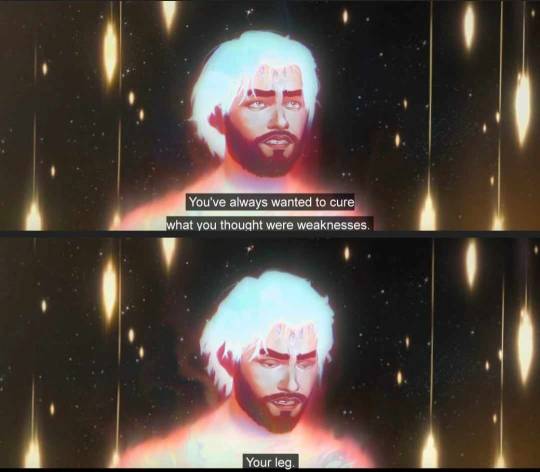
But then we get Jayce saying Viktor ‘always wanted to cure what he thought were weaknesses; his leg, his disease’. Um no, not true? Viktor always wanted to invent things to make a change for the disenfranchised. He couldn't do so because of his terminal illness and Piltover’s politicians not giving a damn about Zaunites. We don't know how he feels about his disability apart from recognising it as a part of his social status as a Zaunite in Piltover. We get the scene when as a child he shows Singed his leg, meaning he can’t play with kids and is lonely. This could mean he’s either shunned or can't access places where kids play. That's an issue of accessibility and how disability is created by alienating disabled people. It’s not enough proof to argue that Viktor dislikes his disability to the point of wishing to fix it when he becomes an adult.
I argue that Viktor’s internalised ableism was forced onto him by the writers. This way they put the responsibility of dealing with ableism on the disabled individual instead of asking the real question: why is Viktor experiencing ableism in the first place? Why is it Viktor who has to bear the burden of injustice and feel bad about himself? Apart from the positive sentiment of ‘disability is a part of humanity and doesn’t mean you’re broken’, the message of the ending seems to be: 'it's sad you feel bad about yourself, you need to hear you’re valid and get over your internalised ableism or you’ll doom everybody, but we won’t be addressing systemic opression’.
Audre Lorde pointed out issues that stigmatised people face, especially having to be representatives of their marginalised position, having to use their intellectual and emotional labor to address oppression. I can’t agree that Viktor taking on the labor of realising his internalised ableism thanks to Jayce’s Speech is amazing writing. His humanity was denied by the oppressors so much he ended up rejecting it all together? The framing of Viktor’s motivation after becoming Machine Herald is extremely detached from his original character’s. I can’t- it seems like they made him self-loath and cause harm just because the final battle would look cool?
I like Arcane’s message that erasing disability is like erasing humanity and love wins in the end. At the same time it’s done at the cost of the disabled character’s entire arc and positions him as the villain to a society of able-bodied people. I don't vibe with that writing choice. If the writers had the guts and we didn't live in capitalism, maybe we’d get more seasons and something truly revolutionary.
Feminist scholars pointed out how people’s standpoints shape politics, how identity, personhood and body are cultural constructs that need to be questioned. Standpoint theory suggests that representation is always a political act and thus disability representation needs to be treated as such. I don't think Linke and others thought about it this way while writing Viktor. They created a great character though, so allow me to open my ao3 tab and look up canon divergent fics.

Because of Viktor’s arc in S2 becoming about having his autonomy revoked and his supposed internalised ableism, we unfortunately got an interpretation that Garland-Thomson notes as widely accepted - that physical disability is a part of lower social status and a personal tragedy. We could have had Viktor as a transformative example of a physically disabled person who exposes social institutions of power and questions the notion of othering as a rule that permeates the Zaun-Piltover conflict. For that to happen, it wouldn't be Jayce who affirmed Viktor as valid - it would be Viktor affirming himself.

And we know he had the capacity to do that. In S1 act 1 he’s self-confident and we know he got to Piltover thanks to his intellect and resilience. Why would he lose these parts of himself so radically in S2? I understand that he was severely depressed and that could change his perception of self when his health deteriorated. Yet, I believe in S2 the acceptance Jayce talks about could have come from Viktor seeing his own value. Garland-Thomson calls it 'speaking with one’s voice’. To be seen and accepted means having autonomy and possibility to speak about our embodiment with other people. We don't get to see/hear Viktor do that. He speaks of his mortality and deteriorating body in the context of disease, not disability. And he doesn’t really react to Jayce’s Speech.
If the creators wanted a really empowering story about a disabled character, they needed to address that. According to Garland-Thomson, the body is a text that needs interpretation by their owners. Giving meaning to his body, affirming it (maybe choosing to change it only to stop himself from dying) would mean that Viktor frees himself from symbolic and systemic violence, and rebels against fantasies and anxiety projected onto him by the normative society. That would have been based as fuck.
I ship JayVik, but it doesn't mean The Speech is all fine. Jayce might understand some of Viktor’s struggles but he’ll never understand him fully. It’s true that Jayce experienced horrors beyond comprehension, saw how his dream destroyed the world, he starved, had to reflect on his decisions sitting in a dark cave and injured his leg. Him acquiring a disability to parallel Viktor is a very important moment, yet it’s not the same as knowing Viktor’s experience of embodiment.
Jayce didn't live with a disability all his life in the society that considered it as something inferior. Jayce didn't live with despair and desperation of struggling to prevent himself from dying of an illness caused by the actions of an oppressive state. Jayce’s speech is emotional and important for his relationship with Viktor, and I did get teary eyed when he expressed how much he adored Viktor. But they lost me with ‘fix weaknesses, your leg, disease, and there’s beauty in imperfections’.
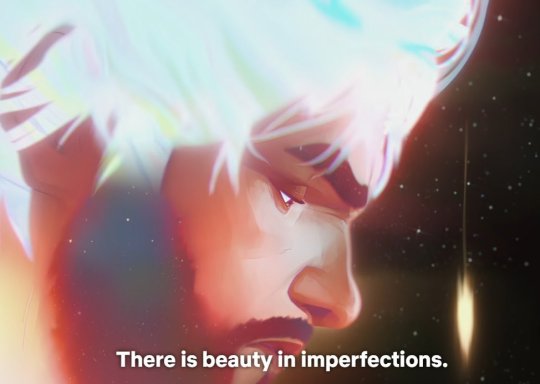
The Speech is sweet on the surface level but it rubbed me the wrong way, because not only it didn't make sense with Viktor’s arc in S1, but it also feels weird to say that disability and terminal illness are an imperfection in which there's beauty. Imperfection is a tad insensitive of a term in this context... Having Jayce - who was more privileged socially, essentially able-bodied all his life and acquired his disability only recently - say this to Viktor, is kind of an odd choice. I do see what they’re trying to say: such experiences shape us but they don't define us. That Jayce loved Viktor as a whole human being with every part as integral to who he is.
At the end Jayce frees Viktor from his loneliness. Lovely stuff and I like it on a personal level, altho the Speech was poorly worded. Narratively, it tells me that the disabled character needed another person to say he was all he needed to be from the start. But it ignores the social context of why Viktor was lonely. Jayces speech shifts focus from systemic oppression and inaccessibility to interpersonal connection he had with Viktor and the emotional side of it. It's possible to both establish a loving bond and acknowledge the discrimination Viktor experienced. But that didn’t happen in the story.
Viktor’s actions as written in S2 seem to stem partially from an immense need for acceptance and a wish not to be lonely. Of course he has Jayce in the end. My JayVik side is kicking its feet in the air and giggling, but when I look at it from a representation perspective it's kind of bad. Jayce is after all a privileged man who has never experienced life long marginalisation, chronic pain and despair of accepting his death when there's so much work to do for a good cause. And he might have understood how lonely Viktor was, how Jayce neglected his partner but still, Jayce cannot fully get it if it's not his lived experience.
Viktor is defined by his body by the unfair society he exists in and it's impossible for him to ignore it, because that's what shapes him every day. It's understandable he’d want to be healthy but I dislike the ‘Magic Cure for disability’ trope they went with in S2 when Viktor merged with the Hexcore. The trope is widely considered regressive and even harmful when it comes to nuanced disability representation. Viktor's case isn't as obvious, so I'm not trying to pass any finite judgement here.
I wish we knew if there were people with disabilities or sensitivity readers at any stage of the creative process of making Arcane.
I’ll be referring to the topic of Viktor’s disability in other sections of my posts, so it’s not really the end of this subject.
THE RADICAL OTHER

As I wrote earlier, the concept of the Other is extremely important in anthropology. There’s a more expanded and emancipatory theory that I'd like to touch upon - the concept of Radical Otherness.
In itself, this concept is disruptive. When we’re faced with the Radical Other, we’re confused. We cannot relate to them, cannot ignore them, our predisposed opinions and structures of understanding are being postponed. It creates a cognitive dissonance, forces us to change perspective, create space for the Other and look for Otherness in ourselves. It can also cause bigger fear and cause us to alienate the Other even further than we initially did.
Experiencing Otherness touches our bodies and senses without us having prior notice of it. This experience disturbs us, it calls on us, it asks us to respond and to react. German philosopher, Bernhard Waldenfels writes in Bodily experience between selfhood and otherness that people usually either welcome the Other as a guest or exclude the Other as an enemy. The Other is always transformed in a way that the normative society has disposal over them or they're available for the society's intentions. Radical Otherness, according to Waldenfels, is not available to anyone.
Viktor's disabled body is turned into a grotesque fusion of flesh and metal, then into an alien-like creature, not a cyborg which would be more in sync with transhumanist ideas of technological augmentation of the human body. The way Viktor looks in his god-like form is aesthetic but foreign.
What it means for disability visual representation is that Viktor either reinforces or rejects the sociopolitical relations that make the disability a kind of Otherness.

Interpreting Viktor the Machine Herald as rejecting oppressive notions, I’d say he symbolises what’s rebellious, exposing injustice and disrupting social order. He left Piltover behind and came back to cause a radical reinterpretation of the world. He looks absolutely different, strange, magical - and we know people of Piltover fear magic. But because he’s the villain and dies at the end, I'm more inclined to say the writers meant to show his transformation as a symbol of unpredictability, lack of stabilisation, anarchy - and that’s both dangerous and brave.
Viktor as Machine Herald can be read as embodiment of personal freedom by rejection of cultural uniformisation. But if it were to be true, he should have rejected conformity while still disabled or at least not transform with Singed’s alchemy. By the time we reach the last episode, his arc is a story of Piltover having to tame ,,the freak’’ as Garland-Thomson would describe it.
The freakiness of Machine Herald’s form is also an interesting choice, because it’s somewhat humanoid but unnatural. It reminds me of the practice of freak shows where people with unusual bodies and disabilities were displayed as freaks of nature, odd creatures. Able-bodied audience gawked at them and while looking in the face of the Others, they’d re-establish themselves as ‘the normal ones’. I hope you catch my drift and see how this is not a good look to have Viktor morph into an alien looking creature that all of Piltover fights in the end…
If I try to find positives in S2’s writing, I can speculate that Viktor becoming the Radical Other in an empowering sense would mean that he embodied an alternative to the status quo. Him leaving and in sense rebelling against domination of Piltover wouldn’t be an intellectual choice but a manifestation of his condition as a person. In this interpretation, his transformation is radical, it’s a positive marker of his individual story.

It’s still a story of oppression though - our Viktor doesn't save himself, Jayce does it for him. I’m not gonna be talking about Old Man Jenkins Viktor orchestrating everything to save himself by having Jayce sent on a mission to save main timeline Viktor. I’m focusing on the Viktor we got to know in S1. It’s beautiful to be seen and supported, the scene at the end was so loving, and my AroAce ass relished it. I love JayVik, yeah, though I think the message of Viktor’s arc being so centered on Jayce’s affirmation of him made the message a bit less complex. They’re soulmates, your honor, but they’re so codependent it’s really toxic yaoi.
Jokes aside, it would be amazing if Viktor chose to become the radical Other. He’d make an autonomous decision to use his status of the Other as the ultimate ‘fuck you’ to the system. The system that overlooked him and prescribed him the identity of an undercitizen, ‘an outsider looking in’.
His arc would be even more profound if he recognised his internalised ableism and chose to become the Machine Herald the way he did in the League Lore. In League, his practices aren’t entirely ethical either, but that's besides the point. His decisions were made out of dissatisfaction with Piltover’s corrupt academia and politics, and the moral duty he felt to aid his fellow Zaunites in the face of calamities and everyday hardships.
The Arcane version of the Divorce arc could’ve made JayVik more complex if they let Viktor express disappointment with Jayce’s decision to weaponize Hextech and Council’s lack of interest in the Undercity’s issues. Then the 'our paths diverged long ago' would be more impactful.
The character arc is a mess but I tried to reach and look for sth more interesting. I think the Radical Otherness of Machine Herald is a compelling angle. Not what writers intended, for sure not, I don’t think they taught anything through that deeply. My take on Viktor the Radical Other is a bit surface level, but it's just one of many things I wanted to share here.
ENDING PART I...
It all could have been more interesting if Viktor wasn't influenced by Hexcore as we’re led to believe, because… this is cheap writing and yet again takes away his autonomy, which he was denied far too much in S2. The magical stuff took away from Viktor’s character and lost focus of his actual motivation.
I think what we got isn’t good enough, but I appreciate bits that can be read as more meaningful, that's where my idea for this 'essay' came from. I just wish the writers had the guts to let Viktor be angry, come back to Zaun, not do the cult stuff and just help people, join the rebellion, basically tell the Pilties: ‘I hope I confuse the hell out of you’.
That’s it for the first part of this analysis. Part 2 coming soon i guess.
literally me writing this fucking dissertation:
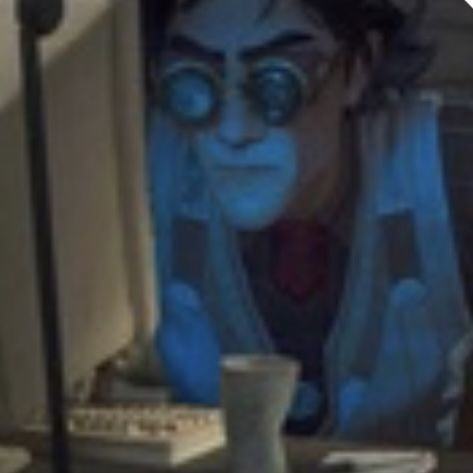
#i wanted viktor's RAGE#i wanted viktor's AUTONOMY#RAGE AGAINST THE MACHINE#(by becoming the machine herald in an act of radical transhumanism and self-reclamation; rejecting the principles that rejected you)#see the however many posts i've made about the writers insisting silco's motivation is his 'dirty little thing' complex#inventing some internalised ableism so viktor's anger is conveniently Really directed at himself#“oh you wanna change an unjust system bc it perpetuates the misery and suffering of the oppressed for the benefit of their oppressors?”#“well that's just bc your REAL problem is your unaddressed insecurities and personal flaws.”#“if you just got over your personal problems you'd be fine.”#arcane critical#viktor
123 notes
·
View notes
Text
Anthropological and philosophical analysis of Viktor’s story in Season 2 - Part II

Eh, here it is, the 2nd part. It’s a direct continuation of the 1st one, ‘cause I’m gonna be referencing lots of stuff from the previous post. So go check that out. Here’s more intellectual rambling.
AFFECTS & RAGE
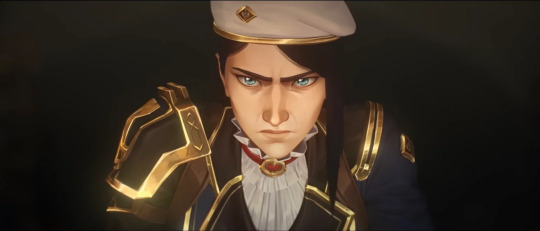
Author Sara Ahmed (my beloved) writes that emotions are more than individual states. Society produces and prioritizes certain groups’ emotional responses over others. She calls these responses, these emotions - ‘affects’. We see the Council members express disgust, contempt and anger directed at the Undercity’s citizens. We see Caitlyn’s reaction to the attack at the memorial, her anger towards Jinx and disdain for Zaunite criminals, the grief over her mother killed in Jinx’s attack. Do Cait's emotions justify her actions, usage of chemical warfare and abuse towards Vi? Seems like they do, from writers’ perspective. Salo is angry and he's presented as corrupted, unsymathetic, but Caitlyn is angry and her actions aren't critiqued by the narrative. Her anger is righteous because she wants to contain the situation in Zaun. That's why she formed the special team right after the memorial. She becomes angry and acts violently, but at the end of S2 she's not held accountable.
Caitlyn's affects and her actions came from her grief and anger, and she considered her choices as right, because as an Enforcer and Kiramann Caitlyn felt that now she has a moral duty to protect Piltover's interests and citizens. She goes on to gas Zaunites because she's protecting Piltover's 'right' to peace and safety. Which is accurate with Ahmed's understanding of prioritized affects - the privileged people can respond to tragedy, loss and trauma with affects such as anger, rage, despair. Ahmed writes about that in Feminist Killjoys (And Other Willful Subjects):
(...) When anger becomes righteous it can be oppressive; to assume anger makes us right can be a wrong. We know how easily a politics of happiness can be displaced into a politics of anger: the assumption of a right to happiness can convert very swiftly into anger toward others (immigrants, aliens, strangers) who have taken the happiness assumed to be "by right" to be ours. (...) (Ahmed, Feminist Killjoys)
Cait indirectly killing Zaunites with Gray isn't addressed as state sanctioned violence and killing, but Renni's attack at the memorial, her anger and revenge she wanted for her son's death are considered wrong. As if Caitlyn isn't acting with revenge as motivation all this time too. Why are Renni and Jinx dead by the end of the story and Caitlyn is supposedly absolved of all her crimes because she... had no energy left to be angry after the time skip? No, the narrative states that Cait is privileged and she can respond to tragedy with anger and violence. Renni and Jinx are Othered, their anger and violence aren't right, these are pathological affects. The narrative takes sides.
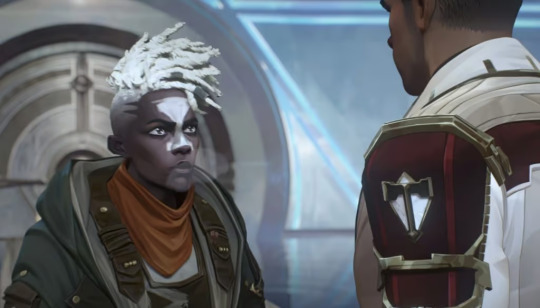
According to Ahmed, rage of the oppressed people is actually the dissatisfaction with the system. Ekko being angry with Caitlyn and Jayce is absolutely justified and necessary. It’s the frustration, the resentment coming from an experience of discrimination and embodiment of the Other. It’s the rage simmering in lifelong trauma, it's an emancipatory rage. Then, community as basis for change, grassroots action that connects marginalized groups - that comes from feelings of empathy, connectedness, determination. That’s what Ekko does with the Firelights.
Ekko is right to be angry, to point out the wrongdoings of privileged characters, to call them out on their ignorance and decisions beneficial only for Piltover. But Ekko’s anger is dismissed by the narrative. He’s basically absent in S2. Why? I think because he's a feminist killjoy. Or rather a Zaunite Killjoy. And the writers couldn't give him space to speak more, because the things he said were too uncomfortable.
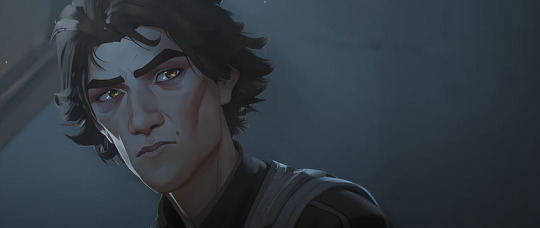
Viktor in S1 is also frustrated very often because of the state of affairs after Jinx stole the gemstone. He expressed annoyance, disappointment and anger at Jayce, at Mel and indirectly at Haimerdinger. Wish we could have seen Viktor's reaction to Cait weaponizing the Gray. It’d have personal significance and further radicalize him, helping in severing his ties to Piltover, fully dedicating himself to Zaun.
And ever since S1 I wanted Viktor to express rage. I wanted him to be so fucking angry. Him screaming and mirroring Warwick during the transformation into the Machine Herald felt so satisfying when I saw it for the first time. Look at him! He's mad as hell! Good.
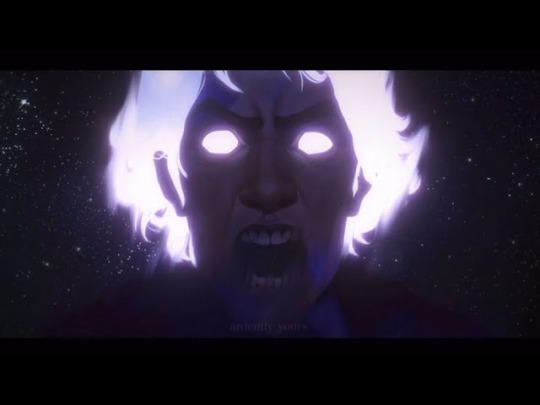
But that's not enough. His rage is only a fragment of the sequence when 'The Line' plays and we writers don't explore Viktor's anger. Which is a terribly missed opportunity. If I was able to rewrite Viktor's arc, I’d make his anger expressed explicitly, he'd be seen in the anger that gathered within him for so long. And it would be justified as he recognizes his supposed internalized ableism and how badly xenophobia, classicism and laws of Piltover affected him and Zaunite people. People who're also angry, as we've seen at the very beginning of S1. Vander went on that bridge for a reason and I dare say revolutions start with frustration, evolve into anger and burst out in rage. People gathered at the rally by Sevika are also angry. Anger calls for action.
(When on topic of Zaunites, it's also fucking horrible that Viktor doesn't bond with Sky over their shared identity as Undercity citizens who migrated to Piltover with the intention educate themselves so they can improve Zaun’s situation in the future. Sky is so underdeveloped it’s making me go insane. She’s used as a plot device in both seasons. A Black woman serving white man’s character arc, she got fridged twice. No words. Now I feel angry.)
Coming back to rage, it's so interesting that Viktor isn't allowed to express it in the narrative the same way Warwick isn't. I mean, he gets feral, but it's not... rage, not really. Originally Warwick is literally The Wrath of Zaun incarnate. And the writers fucked this up by making Vander come back as a plot device to 'unite' Jinx and Vi. It says a lot about writers' real premise and priorities. Warwick couldn't remain the embodiment of Zaunites' rage and a chaotic, uncaged beast, a Radical Other, a force Piltover fears (Salo literally calls Zaun a basement with demons inside) because it's a character in opposition to the state sanctioned violence of Piltover. And the creators don't want to address that. I believe Warwick's mess of an arc in S2 should be studied in the context of politics of affects and specifically how anger is an integral part of Zaun and Arcane as a story. But this post is about Viktor, so imma move on.
Viktor should have had a chance to acknowledge that him working in Piltover won't really help because in reality majority of the Council doesn't want to help. He’s overlooked because of his social status despite being the co-creator of Hextech. The majority of the Council wouldn’t give a fuck about whatever projects he’d present as improvements for the Undercity. Viktor's rage against the system could be so cathartic and satisfying after such a long time of suffering both physically and mentally. Suffering caused by Piltover’s destructive actions and intentional inaction in certain spheres.
And if he chose to augment himself, ideally in a way he did in original LOL Lore, I’d want his thought process to be: ‘You see me as the Other, so I will become the Other in the most extreme way possible, and will do so out of spite and despite of you all’. I’d be screaming, crying, throwing up!! If he saw there's no way he could achieve his dream because the system won't ever allow it. If Viktor left and used his skills to help his people, maybe siding with Ekko and combining their anger to become integral to the Zaun-Piltover conflict, I’d be so happy. Guess the writers could make Viktor prominent in S2 as the villain, but not as the revolutionary he deserved to become.
I want to emphasize how integral affects, specifically anger/rage, are to the Arcane as a series. All characters experience them in different ways. When I saw Viktor's anger in S1 I dreamed of him becoming the Herald through the experience he had in League Lore - in some messed up form of stages of grief, from depression through anger to acceptance.
And that's what should have happened, but S2 destroyed this integral part of Viktor. He can't be angry, because he lost his humanity to the Hexcore. AND IT HAPPENED WITHOUT HIS CONSENT AND NOT OUT OF HIS OWN FREE WILL. What narrative tells us is: the Other needs to be neutralized and then villainized, he can't act out of his own volition, he must be a shell of who he once was, because if he remained himself and acted the way he wanted, he would make everyone feel awkward - his actions would reveal our prejudices.

And Viktor was already established as a Zaunite Killjoy in S1. Specifically in the 'I'm from the Undercity' scene (more on that later) and when Mel implied weaponization of Hextech. Writers of S2 took away Viktor's real agency and took his Killjoy status away, because he'd make it all awkward! If he left Jayce because he was disappointed with him making Hextech weapons for Cait or whatever other reason that connected to the Zaun-Piltover conflict, Viktor would be making a statement: he won't go along with this.
But who is a (feminist) killjoy? Ahmed writes that a person who's marginalized and experiences oppression can become a killjoy in a political sense. Being a killjoy is an act of causing 'social awkwardness' - by expressing dissatisfaction with the system or verbalizing someone's biases, and most importantly entire society's normative and oppressive institutions. A (feminist) killjoy refuses to be neutralized and silenced, it's a political role, a form of action, activism. That's why I think of Ekko as our Zaunite Killjoy who never got the chance to act to his full potential in political sense (because writers yeeted him into an AU).
Ahmed writes:
To create awkwardness is to be read as being awkward. Maintaining public comfort requires that certain bodies "go along with it." To refuse to go along with it, to refuse the place in which you are placed, is to be seen as causing trouble, as making others uncomfortable. There is a political struggle about how we attribute good and bad feelings, which hesitates around the apparently simple question of who introduces what feelings to whom. Feelings can get stuck to certain bodies in the very way we describe spaces, situations, dramas. And bodies can get stuck depending on the feelings with which they get associated. (Ahmed, Feminist Killjoy)
Ahmed wrote about anger in The Cultural Politics of Emotion, in the chapter Feminist Attachments. Her point is: anger is an appropriate response to systemic violence, suffering inflicted on certain groups by those in power and the processes of othering.
That's why Viktor's response to these issues should have been him making people uncomfortable on purpose - with his political stance and his embodiment. As I argued in my 1st post, he should have affirmed himself as a Zaunite and a disabled person, reject Piltover and make a conscious decision to use technology similar to his OG League counterpart (maybe tone down on the amputating limbs part tho). It'd tie with original premise of Arcane, the story of class struggle, of political and social conflicts between Zaun and Piltover.
But the writers didn't feel comfortable with that idea. Kinda awkward.
And the same point about who’s affects, specifically anger, can be expressed was brilliantly analysed by @ceaselesswatchersspecialboy:
(...) to have Viktor question Piltover further, to have him present for Cait’s rise and the gassing of the Undercity and growing brutality towards its people, would mean that it would have to be acknowledged deeper, and that there would have to be actual consequences. Viktor’s arc cannot centre around the conflict of Zaun vs Piltover anymore, because to do so would mean actually addressing the horrifically inhumane acts of Piltover, and the centuries of oppression in a way that justified Zaun’s violence and anger.
And that- THAT IS THE REAL THING! (snatches wig)
Even more importantly, they point out:
Viktor's arc cannot centre around him choosing to become the Machine Herald, because that would mean acknowledging that he has a right to be resentful and hurt, that the fact he was dying was caused directly by Piltover.
Preach it to the heavens. I have nothing to add. (text in quotes was emboldened by me)
As Audre Lorde’s classic quote goes: For the master’s tool will never dismantle the master’s house. They may allow us temporarily to beat him at his own game, but they will never enable us to bring about genuine change. (Lorde, Sister Outsider)
Why then, does Viktor agree to help Ambessa; why then, Vi and other Zaunites join the war? These actions won’t help in dismantling Piltover’s system of power. It's perpetuating violence and destruction. Giving Sevika a seat in the Council isn’t about to bring genuine change. The Council has never worked in favor of Zaunites, so how having one of them at the table helps? There shouldn't be a Council anymore!
Lorde, along with bell hooks, are the most notable Black Feminist Killjoys in the history of the movement. The meaning of anger in political context for the oppressed groups and social justice activists is crucial. Having anger within the fabric of their stories, Zaunite characters should have been given agency to act. And cause awkwardness. The way Ekko made Jayce uncomfortable (get him Ekko!).

I believe Arcane draws far too many parallels to real live social issues and different civil rights movements that writers omitting the political message in Season 2 is simply them indulging in the privilege of ignorance. They allowed themselves to avert their gaze from actual source of Zaun-Piltover conflict, the same way privileged groups irl just 'go along with' discrimination because it doesn't touch them, it's not their concern, it causes them to feel shame, guilt, anger and fear.
And that's what I wanted, I wanted Viktor to cause these affects in Jayce, Mel, Heimerdinger, all of the Council, Caitlyn and just in general, because that just made sense in his character arc and general narrative. The final villain should't be Viktor, the villain was Piltover's power all along.
It would be good if S2 Viktor saw that the glorious evolution was basically him trying to fit in a society that won't accept him anyway. He won't dismantle the master's house by pursuing idealized standards of health and progress. He needed to build connections with people like Ekko and radically reject Piltover and its values because they made him Othered and emotionally miserable.
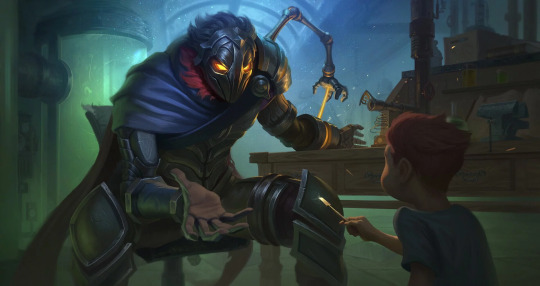
How even cooler of a character he would be, if he said ‘screw you’ to the discriminatory society and tried to build sth different the way he did in League Lore with Blitzcrank (rip) and augmenting people who wanted that sort of help. The transhumanist part of augmentation is kind of complicated, as I explained in the 1st post, but hey, Viktor isn't supposed to be morally perfect. He's all shades of gray and that’s why I love him. But S2 changed him so dramatically, made him do things contradictory to the original character from S1. He became a plot device, not the active engine of social change, and that just makes me uneasy.
In order to make a real change Viktor initially wanted, he’d have to accept his Otherness and become the Radical Other on his own terms FORM THE VERY BEGINNING OF SEASON 2. He’d leave Piltover and Jayce behind for good, because that would be true to his character's values. It would make sense for him to be angry, resentful, scornful. It hurts to say this as a Jayvik shipper but only a bit, just a tiny bit. Imagine the Divorce Era if Viktor went this direction and they never reconnected? Doomed, tragic. Imagine the yearning and inability to reconcile their contradicting worldviews. Soulmates this, partners that, but what about actually giving Viktor a character arc? (i’m partially joking, don't come for me)
Anyway, this approach, with understanding of the role the affects have in political contexts, would be more subversive and focused on the characters' motivations. It'd show how the affects reflect the bigger picture of socioeconomic state of both cities' dynamics. The affect of rage felt and expressed during various events which caused social changes is integral to the history of emancipation and freedom in our world. Arcane touches real political issues but downplays Zaunite characters’ actions and affects. It's supposed to reflect really important issues. But Viktor in S2 is angry only for a split second, and we're not even sure if it's his own anger or if it's just Warwick's blood and Arcane connecting them for a moment. What S2 showed us in Viktor's case is that when the Other gets angry, they’re alienated further and further…
VIOLENCE, NECROPOLITICS & ABJECTIFICATION
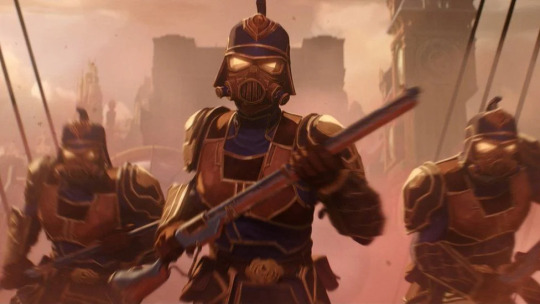
Philosopher Simone Weil wrote that violence/force is the thing that takes away human choice. Systemic violence committed by Piltover took away many choices from Zaunite characters, but they still managed to adapt (Silco, Vander, Jinx, Ekko). Their actions are normal reactions to abnormal circumstances. That’s why Viktor’s decision to use the Hexcore in S1 is understandable - he’s dying because of Piltover causing industrial pollution in Zaun. Yet he made a choice to discard the chance to live after he accidentally killed Sky. He was still the idealist he started as in act 1 of S1, who valued human life above all else, even if it meant losing his own.
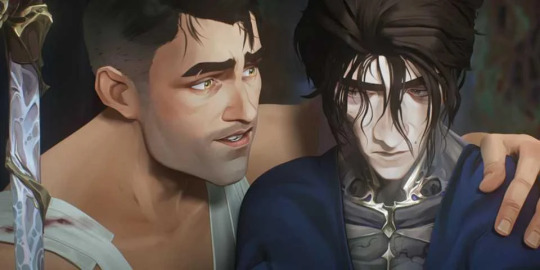
It doesn't feel right from his character arc’s perspective, but it’s a bit understandable that at the end of S2 he said choice is false. Because even when he chose his own fate in S1, the choice was taken from him - in an act of violence committed by a fellow Zaunite (Jinx) and then by his partner. Yes, Jayce merging Viktor with the Hexcore is a difficult decision he made, he saved Viktor’s life, it was out of love, but it’s still violence done from selfish reasons (it’s sort of resembling real situations in which cancer patients refuse treatment while their families push them to change their mind). This isn't ok, to have a disabled character make an autonomous choice regarding his body and life, only then to be taken away by an able-bodied character. Disabled people’s physical boundaries are so often crossed and ignored in medical and social contexts, and it’s maddening to see Viktor experience that in S2.

Now, as an important note to Viktor’s analysis, I’ll delve into violence as an inherent part of social and political conflict. Violence itself is much more than military context. We see a group of Zaunites join the Enforcers in the last episode, they even die during the Noxian invasion while wearing Enforcers’ uniforms, as we see in Gert's final moment (the Zaunites fighting for Piltover is ridiculous, it just blows my mind. Gert and Vi should have been girlfriends change my mind). When discussing violence and protest sociologist Walter Benjamin noted that people in power create legal orders and governments in order to decide what’s considered lawful and unlawful violence. Police can do violence because their actions are sanctioned.
Jinx is considered the biggest threat because her violence isn’t sanctioned. Piltover associates a 'good' type of violence with uniforms and flags, weapons created to ‘defend’ the City of Progress which are wielded by the police. While we see police brutality as evil in S1 and Caitlyn sees the corruption this status quo causes, she then leans into it in S2 and abjectifies Zaunites (more on that later). She gasses them and declares martial law. She might be conflicted and then betrays Ambessa, but it’s not developed enough, so I criticize the message based on what we got - and we got no accountability for the state sanctioned violence.
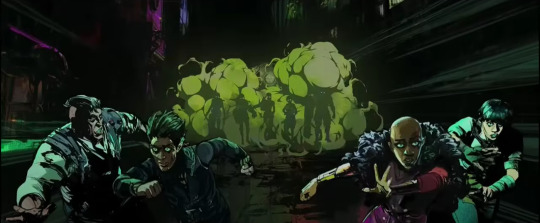
The theory of necropolitics, created by Joseph-Achille Mbembe, states that politics is the power to decide whose lives matter and whose death is justified or unnoted. He writes about this theory specifically in connection to colonialism and racism. I want to use Mbembe's theory to explain how Arcane's narrative allows necropolitics to be implicitly shown but never explicitly addressed.
In S2 Caitlyn abused her power and made a (necro)political decision when she unleashed the Grey on Zaun. And it isn't addressed. The action is justified because it ‘cleared the streets of the criminals’. Their lives aren’t notable. We can imagine the gassing influenced not only the chem-lords and their gangs, but countless citizens of Zaun too. Caitlyn’s politics, and Piltover’s in general, categorizes Zaunite lives as expendable. Necessary sacrifices for progress. Justified, somewhat indirect killing. We have many examples of such political decisions in our world I think...
And at the very end, Viktor is also forgotten, nobody puts his name in the bowl during the tribute on the bridge, he’s considered a villain (‘Viktor is at the center of all of this, isn't he?’). Necropolitics explains that political power also decides who is worth grieving. With this in mind, I think S2 gives a very uncomfortable message. Judith Butler explains it quite well in Frames of war. They write:
Ungrievable lives are those that cannot be lost and cannot be destroyed, because they already inhabit lost and destroyed zone; they are ontologically, and from the start, already lost and destroyed, which means that when they are destroyed in war, nothing is destroyed. (Butler, Frames of war)
And who died in this war? Viktor, the empathetic scientific genius, the disabled man, the Zaunite.
Other Zaunites died too. So did Jayce. It’s incoherent how Jayce goes from declaring Viktor as dangerous to then dying together while touching foreheads in a Zaunite gesture of love. I mean, I get it, Viktor is actively turning everyone into senseless machines which is objectively bad. But from the narrative perspective it irks me that the creators decided it’ll be Viktor and Jayce who bear the consequences of this conflict. Not the Council, not the nobles of Piltover, not the police. And we can only assume that some of the Zaunites who died in the war against Noxus were remembered on the bridge. But why is it that they had to die in police uniforms while protecting Piltover in order to become worth grieving?
Sara Ahmed also writes that associating certain affects with a group of people makes it easier not to grieve for them. The way people of Piltover speak about Zaunites exemplifies it: addicts, criminals, animals, creatures, demons in Piltover's basement, trenchers, associated with disease, lack of order, threat, dirt, danger.
Making Viktor ungrievable in the end is also pretty fucking bad on writers' part, because in many societies disabled people are oftentimes considered socially useless, expendable and half dead already. With Viktor’s story as context this is even more unsettling.
Earlier I made a point that Caitlyn abjectifies the Zaunites. Abjectification, as Butler writes, is an act of turning certain groups considered inherently dangerous into ‘abjects’ and not subjects of the political stage. Abjection basically means an emotional and bodily reaction to something considered repulsive, uncomfortable, threatening and undesirable. According to Piltover's (necro)politics Zaunites are abjectified and need to be managed with sanctioned violence for 'public good'. The narrative of S2 tried to fool us with the ‘humanity needs to be protected’ plot while using Viktor and foreign military as threats. I see it as another attempt at dodging actually important and difficult discussion of class divisions and power dynamics. They did, after all, make Zaunite the final boss.
I wrote at length about Viktor's relationship to his embodiment and how the concept of Other is important while reading his arc. His body isn't normative so it's abjectified from the start. His disability is a marker of difference. Butler in their book Bodies that Matter explains that abjectification is a process that creates 'unlivable and uninhabitable zones of social life' in which certain people exist not as subjects, but beneath 'the domain of the subject'. In Arcane it's perfectly exemplified in the way Zaunites live literally under Piltover - their lower social status is signified by the proxemics of the cities. Viktor wasn't allowed to inhabit certain spaces both in Zaun and Piltover due to his disability and social status. He was then taken into the 'unlivable zone' in his own narrative because his agency and anger had been taken away. He was then made into a villain and died. This way he was abjectified by Piltover's systemic violence and its necropolitics as well as the writers' own unconscious process of abjectification.
Viktor was Othered on many levels within the story, he was this way because the creators made this decision, they made him a disabled person and a Zaunite. As I pointed out before, representation has real life consequences and writers have responsibility when they write characters with experiences similar to real people. In Viktor's case people with disabilities and lower social class. In the end of S2, Viktor vanishes completely, ungrievable, abjectified, no more a subject with his own affects and dreams. He became the 'abjected outside' as Butler would call this status. He was literally sucked into the rune, away from Piltover. Abjected outside, rejected yet again (maybe this time on his terms, but why should the narrative force him to bear the emotional labor of this decision? why punish him for adapting into abnormal circumstances he was thrown into?), forever an outsider looking in...
Jayce might say the final fight is about ‘humanity itself’, but I see it for what it is - a veil hiding the fact that writing Zaun vs Piltover civil war would mean admitting that Zaunites have the right to fight the abjectification. And there’s no way we can deny the real world implications of that.
THE SPECTACLE OF OTHERING
The very first thing that specifically sparked my idea to write this extensive analysis was this frame:

The marionette is perfect in form, white and gold (like Mel’s og outfit), slim and fancy, perfect by Piltover standards, but still has the Zaunite touch of art nouveau aesthetic. It’s made from flesh of a Zaunite and the metal that came from the industrial waste in the pits of Zaun.
The marionette is displayed by Jayce and evokes a reaction of fear in the people gathered. It’s lying on the table, looking graceful but uncanny. Everyone in the room is scared because it’s inhuman and dangerous. Even when Viktor inhabited what he thought was an embodiment of perfection, in the end the Pilties still rejected him. Because he’s from Zaun, he’s a creature, Zaunites are not human in their eyes - so is Viktor no matter how he changes. He's dead already, even for Jayce.
It scares me how unsettling it is when Jayce unveils the marionette - basically Huck's corpse that Viktor used, it doubles the distress I feel when I see it. The body of a Zaunite was used by his fellow citizen whose goal was the betterment of the Undercity, but turned into eugenics because of him internalising the stigmatisation. Both Huck and Viktor were oppressed because of their origins and disability, and in the end they both die.

In S1 Viktor is considered by Jayce as one of ‘the good ones’ - same way Vi was called by Maddie. But Viktor remarks he’s still a Zaunite and isn't different to those Jayce calls dangerous. He reveals Jayce’s prejudice; as much as Jayce loves Viktor he’s still shaped by his environment. Thinking of Viktor as an exception confirms Jayce’s unconscious conviction that Zaunites are Other, they can be dangerous.
Ironic, how at the end in the Council chamber Jayce presents Viktor as the ultimate danger. It’s an odd parallel. In S1 Jayce orders a blockade, locking Zaunites’ access to the bridge, so they get angry (remember the affects stuff?), and then Jayce calls them dangerous... In S2 Jayce indirectly calls Viktor the biggest threat and names the Hexgates ‘the last bastion of salvation’, he then tries to make it inaccessible for Viktor. Viktor should be absolutely fuckin' fumin' babes.
Jayce talking about the threat Viktor poses in S2 is reestablishing Jayce’s bias from S1 when he ordered the blockade and told Viktor in the face that Zaunites are threats. Gurl, your partner is a Zaunite. One season later Jayce presents the marionette and actively portrays his ex(partner) as the bad guy.
And then Jayce’s character does some real gymnastics in the astral plane when he expresses his love to Viktor hoping to snap him out of Machine Herald mode. If Jayce loved all of Viktor and truly understood him, then why the fuck did the writers made their actions and statements contradicting several times. If they had good writing skills left, they’d write Jayce like at the end of S1 when he took Viktor to the Council, finally let him speak and declare the proposition of Zaun’s independence. Writers could just… not do all that Jayce Judas Era in act 2 in S2. Idk fam, these characters were just devices to push preexisting tropes and cliches forward, the series turned into Avengers instead of more compelling and character driven story it was before. I’m mad again, so let’s move on.
The display of the marionette reminds me again, more literally, of the freak shows where disabled people were a show for able-bodied audiences (I wrote about that more in the 1st post). The doll might look perfect, but we know it's a corpse of a marginalized person addicted to shimmer who acquired a facial deformity before Viktor healed him. The marionette is a stand-in for Viktor, a disabled person who's now being talked about by Jayce as the looming threat to all of society, humanity even, ‘both bottom and top’ (love how Sevika and Scar walked out, I know that's right!).
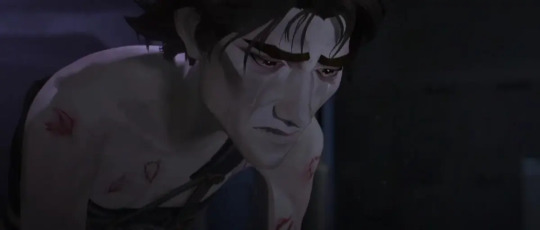
The doll on display is like an extension of the spectacle that was Viktor's body in both seasons. He's the character whose nudity is shown the most often in S1 and S2, it’s borderline voyeuristic. His disabled body is on display when he experiments on himself in the lab, we see close-ups of his back brace, we see him crawl on the floor in nothing but underwear and braces. Not to mention the self-injuries he makes by craving runes on his body. In S2 he’s basically naked all the time except for the goddamn blanket. His body is hyper-visible because of things he uses to aid it: the cane, crutch, leg brace, back brace; and because of his body itself: the nudity, skinny frame, pale skin, dark circles under eyes, prominent bones, greasy hair, bloody cuts.
As Rosemary Garland-Thompson wrote in Extraordinary bodies, disability is very often marked hyper-visible for the majorly able-bodied audience and causes a visceral reaction of compassion, pity, awkwardness, fear, uneasiness, sadness. I can’t talk for everybody’s emotional reactions to the scenes I'm referencing of course, but there’s something to be said about the choice the creators made when framing Viktor’s bare body. Physical disability and self-injuries are very misunderstood and make many people anxious, because they’re different from what’s considered ‘normal’ or rational by the normative rules of society. Both Viktor’s disability and self-injuries are markers of his extreme vulnerability as well as desperation and unpredictability of his actions.
For me, an able-bodied person, these scenes feel too intimate and painful to watch without feeling like a voyeur. I even feel weird putting the picture for reference. Not because his body itself makes me uncomfortable. It’s about the visual framing of him that the creators made, and it feels like a spectacle of Viktor’s ‘broken’ body and his moral downfall in S1. It allows us to deeply empathise with him and see him at his lowest, which isn’t a bad thing all together, it’s a raw depiction of pain and determination, integral to his character arc and embodiment. At the same time these scenes are like a double-edged sword and can be read as extremely exploitative.
Ahmed claims that there's no private suffering. That what we experience on our own is always linked to the outside, to the societal rules, cultural meaning and politics that influence our lives, our embodiment. She also writes that it's imperative to respond to the pain of other people, to respond to our pain and act. This idea ties to the Feminist Killjoy role and affects I wrote about. Viktor suffers on his own basically until the very end, only to have Jayce's loving presence in their final moments. Viktor's suffering was a direct effect of politics and socioeconomic situation he lived in. As Ahmed writes, in order to respond to pain, social movements such as feminism must open up safe spaces for the disclosure of pain. We need make spaces for the 'speaking about pain'. This, for Ahmed, is a condition that allows for unification of people in 'different stories of pain that cannot be reduced to a ground, identity or sameness' (Feminist Attachments).
This is the reason Viktor needed to meet other Zaunites, other disabled people and speak about his pain. Speak about his disability. Viktor should have been given agency to 'speak in one's voice' (as Garland-Thompson wrote) and 'speak about pain' (as Ahmed wrote). Then his arc wouldn't become a spectacle of Othering, it would be a raw story of emancipation that wouldn't fall easily into the Inspirationally Disabled/Disadvantaged trope.
Viktor’s body is an inseparable part of his character, but it makes me uneasy how the focus on his body is fetishistic at times. And then the doll he controls in S2, while it looks perfect… is still unsettling to see. And it's displayed by Jayce in another form of spectacle... Narratively speaking, he’s an outsider just like when he first stepped foot in Piltover. He’s not dying now, his physical disability is gone, but he got rid of the body that was his lived experience. And it's depressing to watch.
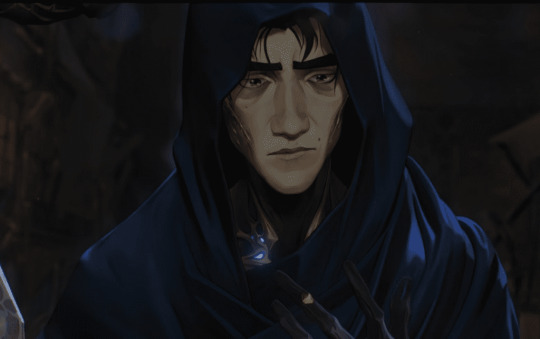
Viktor depersonalized after emerging from the hexgoop (?), he seems to be apathetic and disoriented (‘What am I?’). The body horror part is reminiscent of the freak shows where disability was a pathological state, congruous to monstrosity. We don't get Viktor’s inner thoughts and feelings on his body’s current state and that's stupid. His experience was inextricably connected to his body and how he experienced this embodiment. And he was disconnected from it. Because the writers thought so??? And didn't bother to explore it???
It's a question of what makes us ‘us’ - body? mind? soul? There are multiple metaphysical answers to that. Arcane tried to be meta with Viktor's Messiah arc but it falls flat in the end. He basically became transhuman three times! (after getting out the goop, being in the astral plane where he exists beyond flesh and its ‘limitations’, and at the end when he became the alien Machine Herald) That's crazy. I'm not getting into the transhumanism part of his LOL Lore and what it could mean, but I firmly believe it still should have been a part of Arcane Viktor's story, we prolly would need one more season to explore everything I suggest.
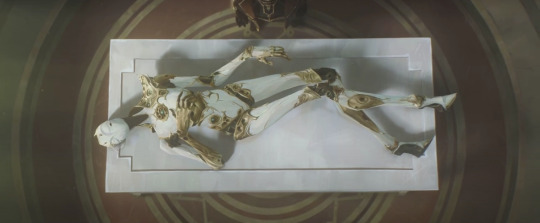
What Jayce shows when displaying the marionette is a sacrifice on an altar - Viktor’s character and all of Zaun were sacrificed by the narrative and creators for the sake of a generic plot where the good guys (actual oppressors) have to fight the big bad (actually oppressed) who’s going to end all of humanity. This ignores the reason Viktor even does what he does - the root of it all is Piltover's necropolitics and the establishment that doesn't allow social change
It's even exemplified in Vi and Cait staying together - Cait loses an eye but so what, she still gets rewarded by the narrative. She isn’t held accountable for her actions and gets a girlfriend whose trauma isn’t explored by the writers at all. The implications of Vi’s relationship with a former cop and fascist aren’t addressed, and it’s considered romantic by the creators and many fans. Sorry, but I can’t ship CaitVi the way I used to. My lesbian heart is broken, but I can’t in good faith consider this ship as anything but romanticization of abuse and a complete lack of class consciousness on creators' part. I wanted Cait and Vi together, happy. But not the way it turned out in the final version. Fanfiction writers you're my only hope for fixing this.
FINAL THOUGHTS
In the end the person who gets to tell the story is Cait, the Piltie and an enforcer turned dictator, who embodied the oppressive practices and the status quo which thrived from inequality and militarism of the police. The winners tell the story, people like Jinx, Silco and Viktor are painted as villains when they actually had reasons to rage against the Piltover's machine of bigotry and hatred fueled by greed of the privileged.
Viktor's name was removed from the Hexgates’ blueprints, he was forgotten as he feared he would be, he wasn’t grieved by anyone. Necropolitics at its finest. And that makes me fucking sad and pissed off. He deserved so much more. Yes, Arcane is a tragedy and all, but Viktor's arc in S2 is astoundingly OOC and destroys the core themes his story established in S1. And the ending he gets, even though he’s with Jayce, gives a very off-putting message. Sorry JayVik nation, I’m one of you, but the writing is as poetic as it is problematic.

This story is so centrist, pro-establishment actually, and not as subversive as it promised to be. It treats rebellion as an aesthetic and sacrifices characters from the oppressed group in order to uphold the power of the oppressors. Because to show that political change is possible they’d have to acknowledge what's wrong with the system, how it affects real people, how affects such as anger are justified, how abjectification, othering and violence destroy people and their entire worlds.
This destruction, the senseless waste and conflict Viktor speaks of, that's what happened to Powder/Jinx and Vi in the 1st act of S1. We saw what happened on the bridge, with Vander and Silco's anger that went further and further. The main story started with a group of kids robbing a wealthy apartment because they needed things, they needed money, they were Zaunites taking from Piltover because these kids were growing up 'knowing they're less than them'...
I needed Viktor and Vi's traumas to be talked about by them, in their own voices. They needed to speak about their pain. Too bad if CaitVi and JayVik wouldn’t work as ships then. That would be the real thing. A tragedy. They'd split because the political climate and differences in their values are impossible for them to reconcile. Either that, or the Piltover cast had to admit their wrongs and actively help their loved ones in Zaun’s rebellion. And it should have happened not only because Jayce loves Viktor and Cait loves Vi, but because Jayce and Caitlyn see the inherent value in Zaun’s freedom. Cait saw Ekko’s community in S1 and still became a fascist. Jayce heard Viktor’s stance on weaponization of their work and saw the real consequence of Piltover’s oppression while witnessing Viktor slowly dying, being so destroyed by everything he even considered suicide. And this is the real tragedy - Cait and Jayce could have been actual allies. But we don't live in the timeline where such a story was told.
We got a promising S1 with a really compelling premise (Silco they would never make me hate you) and then it got fucked up. The threat isn't the government, it's the stigmatized group acting out because they’re pushing back against the oppressors. The person whose actions are deemed evil is a Zaunite aided by the foreign warmonger. It shifts our focus to outside forces (Ambessa) influencing Piltover and scapegoats Viktor as the ultimate danger. The Other, not a radical one. The reason he became the Herald in Arcane was his internalized bigotry perpetuated by the government and society of Piltover. It wasn't Viktor becoming a Zaunite Killjoy because he wanted to. Because that was the right thing to do. I’m so mad y’all, if you couldn’t tell by now.
If you start a story about oppression then commit to it, cowards. But that was never the intention of the writers, centrist bs shows and it’s not a good look.

They character assassinated basically everyone because writers wanted a cliche ending. It was enjoyable but not compelling. It was visually stunning, animation, as they say, fucks severely, voice actors did an amazing job, the emotional layer was quite touching (altho emotional moments didn't feel earned enough), the music really slaps (Renegadeeeeee), Viktor’s looks were so tea they killed him 3 times. But in terms of writing? It’s a disappointment. In terms of storytelling and cultural meanings? I think you got my idea, nothing could stop me from overintellectualizing this show.
That being said, I love Viktor even though I've got a lot of critical thoughts on the final version of his arc and the message the creators give on disability rep which is... not coherent. Not good sometimes. But for sure Viktor is complex and very important as a disabled character in popular media. And I will love him until the day I die and then some.
Why did I write this? Idk. Perhaps because I can't shake off the feeling that Arcane writers touched so many important philosophical and social/cultural concepts but didn't do the research or commit to the premise and lost an important message. I wanted to analyse it because as Garland-Thompson said representation shapes identity and lives of real people. I’m happy to see how many people love Viktor and feel represented. I'm glad to see so many people enjoy him while being critical. His story is complex, there’s many points to be made, my take is only one of many, so… the answer would be that we need more disability representation that involves actual disabled people’s voices in the creative process. It’s their experiences and opinions that matter.
TL;DR Viktor’s arc in S2 is a trainwreck, I mourn what could have been. He’s one of the characters ever, important for creating nuanced disability representation. There’s a ton of themes needed to be explored. Implementing culture studies and philosophy into Arcane took me a over a week to research thru my notebooks from Uni. The writers had no idea what they wanted to say about anything other than maybe 'riots are cool, but actually overthrowing the government is a bit much'. Is Viktor still an icon, a legend, a moment? Come on now.
This is a draft of my PhD and THAT’s all. Anyway,

Viktor you'll always be famous to me
#10/10 no notes perfect analysis#well okay 1 note and that is that they did the same thing in s1 with silco's eye#silco is a disabled character. his disability is the result of piltover's violence at varying degrees of proximity:#the fallout from a protest against piltover's oppression; vander's fear that piltover would simply kill more of them#the toxins in the river resulting from piltover's neglect#but never in s1 is silco's eye used as an indication that he is a victim of piltover#instead it's used to symbolise silco's own villainy; his literal and metaphorical corruption; the anger and trauma that blind him; etc. etc#his disability is used to make him monstrous and to communicate that he is a monster#i believe that's what the youth call a Big Oof#arcane critical
137 notes
·
View notes
Text
Sevika is my favorite character but it is hard for me to analyze her because I feel her ending is so unfitting for the rest of her writing and feels so forced it makes me second guess every other thing that was established about her, it is truly sad to me how the conclusion for such an interesting character ends up being imo a lazy way to tie lose ends for the rest of the abandoned Zaun vs. Piltover class war plot line.
I was thinking about this because I found this concept art of how Sevika would use Silco's office as her room after his death and it is so harrowing how for Sevika her entire life was Zaun's liberation.
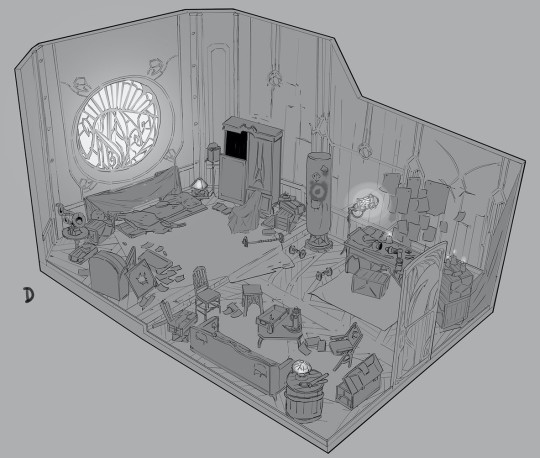
The thing about her is, unlike Silco who at least had Jinx, she 100% sacrificed her whole personal life for revolution and thus perhaps her compromise to it was even higher than Silco's and then she becomes part of the same system that she spend her whole life fighting against? How do we make any sense of that?
I see Sevika leaving Vander, because of his refusal of fighting against Piltover, as such an important point for her character and I would argue probably the most important we see in establishing who she is, her ideologies and how much she is willing to sacrifice for that dream. Then Act 3 happens and it is such a weird watch for me because clearly the writing was trying to re-establish her as a sort of Vander figure with the whole "we don't hand over our own people" thing (even though I would argue her motivations where ideological while Vander's were personal), her giving a speech on Vander's statue, under his shadow. It feels like an attempt to make her into a "good-zaunite" by making her into a completely de-fanged version of herself and what that ends up meaning is her becoming non-threatening to the status quo and instead becoming part of the system, legitimizing it and therefore protecting it.
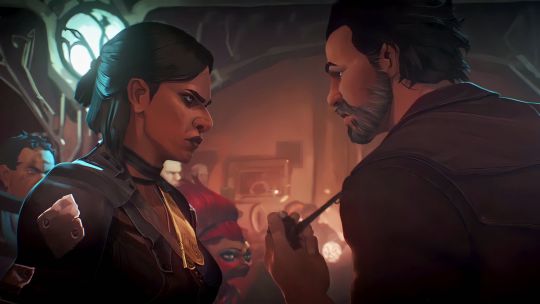
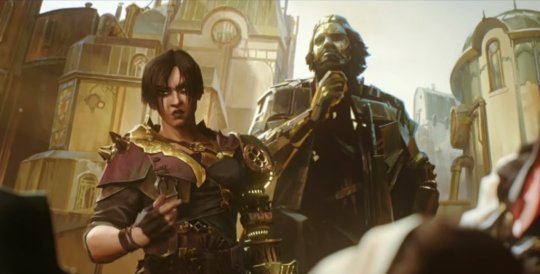
In this regard I think that Sevika choosing to follow Silco might be as important as her abandoning Vander. I find their relationship very interesting because they have similar ideologies and Silco is so dependant on Sevika and they both know it, for over 7 years she could have abandoned, betrayed or disposed of him but she didn't because she understood that violence was the only way to liberation and in that path she did all sorts of reprehensible things just like Silco for that ultimate goal again with the understanding that violence was necessary, she chose Silco because she understood that liberation would come through struggle not by manking deals with your oppressors like Vander did... And then just like Vander she ends up doing exactly the same thing, rendering all those years of struggle, all those actions, violence and atrocities meaningless.
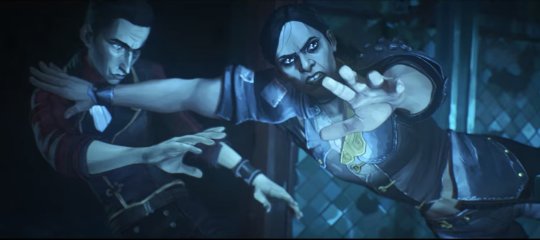
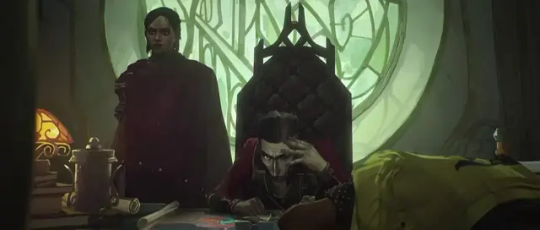
And so for me most of what we knew of her character and what was established about her ideology becomes nonsensical when we see how she ended, either you take it as she completely betrayed herself and what she fought for her whole life or she was never the person the writing showed us her to be and just acted without thinking all those years (?). Furthermore we are shown just few episodes before the end how the people of the undercity don't even listen to her, so again it is just confusing how she ends up as a council woman for a city that doesn't even want her.
Ultimately if this was some sort of commentary about how revolutionaries can become sucked into politics and be de-fanged in favor of becoming part of the system rather than fighting it I could accept it even if I didnt like it but with how reactionary and anti-revolutionary s2 is, it just feels more like a "see? violence is never the answer! if you want change just become a diversity hire and change the institutions that oppress you from within!" /sarcasm
241 notes
·
View notes
Text

#something about the parallels between the rabid opposition to criticism of arcane s2#[we will concede one (1) crumb and admit that the pacing could have been better but any other criticism is Bad & Wrong & must be Silenced]#and vander's false peace with piltover#[trenchers can rob and murder each other all they like and piltover will turn a blind eye but Must Not Ever Disturb the Masters' Peace]#[simply keep your head down and submit and accept what you are given and you can have one (1) scrap of peace & prosperity]#and the narrative of s2#[resistance is Bad and Wrong and Futile and the only morally correct way to enact change is to do nothing]#[and wait for your oppressors to stop oppressing you out of the goodness of their hearts and give you one (1) crumb of representation]#[so they can pretend like they've done something meaningful]#[and you can convince yourself that trying and inevitably failing to work within the system to change it is enough]#and the metatextual implications of it all#[we've given you one (1) crumb of sapphic representation and some ultimately empty gestures at class themes. aren't we So Brave?]#[be satisfied and accept what you are given and absolutely do not question the implications of our other authorial decisions]#all drinking from the same trickle-down champagne fountain of kool-aid#(YES I KNOW IT WAS FLAVOR-AID)#anyway
19 notes
·
View notes
Text


ARCANE: 2x06 — “The Message Hidden Within the Pattern” ↳ Singed's old man walk
#not a single ounce of urgency in his entire bony body#everyone else is on singed's time#character of all time 10/10 no notes#arcane#singed
137 notes
·
View notes
Text







ARCANE: Singed ↳ A hands appreciation post
107 notes
·
View notes
Text
remember when we all laughed at how heimer went on a lil tour of zaun in s1 and gave up in self-pity after five minutes because people were mean to him 🥺
that was still more direct introspection on how his own failures have harmed the people of the undercity than cait had in s2
thinking about the fact that arcane gave gert more of a moment of honest self-reflection over her 🥺 unfair prejudice 🥺 against enforcers 🥺 than they gave cait over the impact of a single one of her actions on the people of the undercity
241 notes
·
View notes
Text
thinking about the fact that arcane gave gert more of a moment of honest self-reflection over her 🥺 unfair prejudice 🥺 against enforcers 🥺 than they gave cait over the impact of a single one of her actions on the people of the undercity
241 notes
·
View notes
Text
This is one of the things that makes me so 🙃🙃🙃🙃 over S2, because they did the same thing to Viktor. They took that 'dirty little thing' mischaracterisation of Silco, and slapped it on Viktor instead, to give him a whopping case of internalised ableism that was Secretly Fuelling His Actions The Whole Time (so secretly that it was nowhere to be seen in S1, even).
"Oh, you want to change a fundamentally unjust system because it causes untold misery and suffering? Well actually, you're just angry because of your unresolved personal insecurities, and if you just stopped being insecure, then you wouldn't want to change the system. Problem solved!"
Despite me having issues with young Silco and thinking he’s too chill etc, that he’s ooc, for the most part I like him cos I like a bunch of choices they made with him.
I think for me it mainly boils down to 1) similarities with Jinx and in general portraying young Silco as tho he’s, well, young 2) not opting for the pathetic backstory route.
We already got a bit of a taste of that with the ‘dirty little thing’ quotes from the writers that thankfully at least didn’t actually make it on screen. But what if they did? A chill popular hip young Silco with his nose in his Nation of Zaun notebook is infinitely better than ‘dirty little thing’ Silco.
I think what’s so off with this idea for me is that Silco in s1 is an idealist and a dreamer. Suggesting that actually this guy has some deep seated insecurities takes away from that cos suddenly the focus of everything this guy does isn’t on his ideas and how he shared them with Vander and that’s what brought them together but on him managing his complexes and being obsessed with the one person who was nice to him.



I get giving such insecurities to eg Vi, a character who was a teen who was then imprisoned and unable to fight back/escape from these ppl who are supposedly superior to them. A character who in s1 actually had this established as part of their character “I grew up knowing I'm less than them, that my place is down there.”
But I’d think that out of all the characters the guy who looks into the distance and it’s like he can see the Independent Zaun in front of him, the guy who’s willing to commit atrocities for his cause, the guy who says “For respect. Opportunity. Everything they've denied us. [...] We shared a vision, Vander. A dream of freedom. [...] Played lapdog after everything we suffered.” is a guy who would be extremely confident about the stuff he believes in and not secretly have insecurities about being ‘dirty’/inferior. why would he ever behave and talk like that if he didn’t actually believe with every fiber of his being that they are equal (or maybe even better) than piltovans cos he's a dreamer and he can see it in front of his eyes when he looks into the distance even if they're not treated like that in the present.
I get the general idea that probs all zaunites have some complexes regarding Piltover but out of everybody to try to suggest that actually only for Silco it’s THAT big of a deal when in s1 it was the opposite is just nah. You’d think a character who says “The sons and daughters of Zaun deserve more than their runoff.” has ideological/political beef with Piltover and not dealing with his personal insecurities and wanting the approval of his abusers (Piltover/Vander). The last thing s1 Silco wanted was approval of him/his actions by others, like omg, he couldn't care less what others thought, it was one of his more distinct characteristics. ‘dirty little thing’ undermines the core of Silco’s character. If he’s not a dreamer pursuing his dream then what even is he. some guy who’s primarily preoccupied with the feeling that he is not enough? and that's why he fights and doesn't like Piltover? and that's why he's committing atrocities? in the name of getting ppl to like him???
Young Silco not giving a shit about Felicia’s issues, doing his own thing in his notebook whatever everyone else around him is doing, having a SYMBOL and a FLAG for his nation. It’s not bad. He’s still too chill/calm/fangless tho but I still think he was done the best out of the three.
126 notes
·
View notes
Text
Right? Like, if you want to argue that Caitlyn totes made amends for her little oopsie foray into brutal authoritarianism by 'giving' 'her' Council seat to a representative from Zaun (which she didn't)... why would Caitlyn give it to Sevika?
Sevika, the individual who - at least to Caitlyn and Vi - is no more than the one who betrayed Vander, helped get most of Vi's family killed, served as Silco's loyal right hand for seven years, and almost killed Vi twice?
Caitlyn didn't give Zaun shit.
Caitlyn stans: Why don't you guys criticize Jinx, Silco, and Sevika as much as you do Caitlyn? Sevika is a baddie too! She was the right-hand to Silco's drug empire, and also let me proceed to tell you for the 5894th time about how Jinx-
Also Caitlyn stans: Caitlyn "gave" her Council seat to Sevika. Isn't that so niiiiice!
Me:

So... is Sevika an irredeemable monster or not, because if she is then Caitlyn actually did a pretty BAD thing "giving" her a Council seat... right? These stans never make any sense.
83 notes
·
View notes